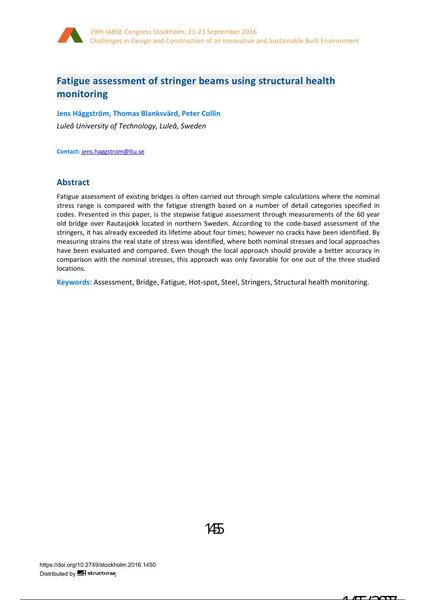Fatigue assessment of stringer beams using structural health monitoring

|
|
|||||||||||
Détails bibliographiques
| Auteur(s): |
Jens Häggström
(Luleå University of Technology, Luleå, Sweden)
Thomas Blanksvärd (Luleå University of Technology, Luleå, Sweden) Peter Collin (Luleå University of Technology, Luleå, Sweden) |
||||
|---|---|---|---|---|---|
| Médium: | papier de conférence | ||||
| Langue(s): | anglais | ||||
| Conférence: | IABSE Congress: Challenges in Design and Construction of an Innovative and Sustainable Built Environment, Stockholm, Sweden, 21-23 September 2016 | ||||
| Publié dans: | IABSE Congress Stockholm, 2016 | ||||
|
|||||
| Page(s): | 1455-1462 | ||||
| Nombre total de pages (du PDF): | 8 | ||||
| Année: | 2016 | ||||
| DOI: | 10.2749/stockholm.2016.1450 | ||||
| Abstrait: |
Fatigue assessment of existing bridges is often carried out through simple calculations where the nominal stress range is compared with the fatigue strength based on a number of detail categories specified in codes. Presented in this paper, is the stepwise fatigue assessment through measurements of the 60 year old bridge over Rautasjokk located in northern Sweden. According to the code-based assessment of the stringers, it has already exceeded its lifetime about four times; however no cracks have been identified. By measuring strains the real state of stress was identified, where both nominal stresses and local approaches have been evaluated and compared. Even though the local approach should provide a better accuracy in comparison with the nominal stresses, this approach was only favorable for one out of the three studied locations. |
||||
| Mots-clé: |
acier pont
|
||||
